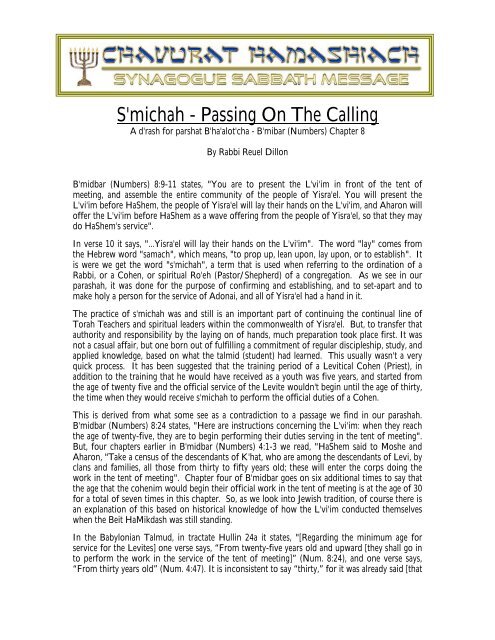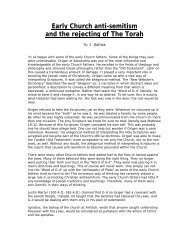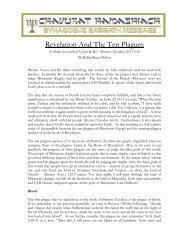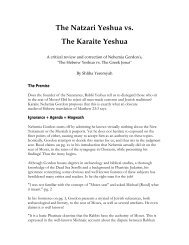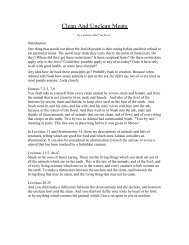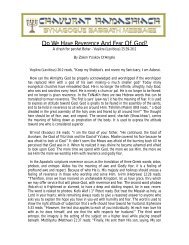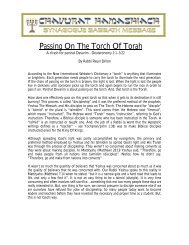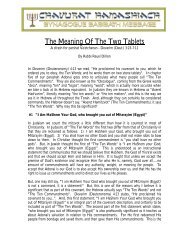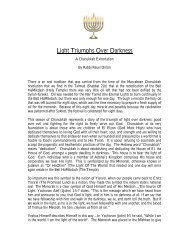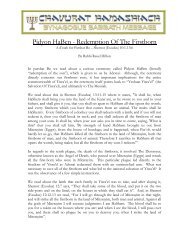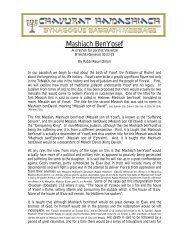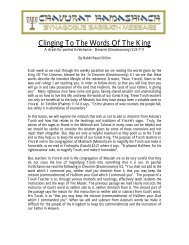S'michah - Synagogue Chavurat HaMashiach
S'michah - Synagogue Chavurat HaMashiach
S'michah - Synagogue Chavurat HaMashiach
Create successful ePaper yourself
Turn your PDF publications into a flip-book with our unique Google optimized e-Paper software.
<strong>S'michah</strong> - Passing On The Calling<br />
A d'rash for parshat B'ha'alot'cha - B'mibar (Numbers) Chapter 8<br />
By Rabbi Reuel Dillon<br />
B'midbar (Numbers) 8:9-11 states, "You are to present the L'vi'im in front of the tent of<br />
meeting, and assemble the entire community of the people of Yisra'el. You will present the<br />
L'vi'im before HaShem, the people of Yisra'el will lay their hands on the L'vi'im, and Aharon will<br />
offer the L'vi'im before HaShem as a wave offering from the people of Yisra'el, so that they may<br />
do HaShem's service".<br />
In verse 10 it says, "...Yisra'el will lay their hands on the L'vi'im". The word "lay" comes from<br />
the Hebrew word "samach", which means, "to prop up, lean upon, lay upon, or to establish". It<br />
is were we get the word "s'michah", a term that is used when referring to the ordination of a<br />
Rabbi, or a Cohen, or spiritual Ro'eh (Pastor/Shepherd) of a congregation. As we see in our<br />
parashah, it was done for the purpose of confirming and establishing, and to set-apart and to<br />
make holy a person for the service of Adonai, and all of Yisra'el had a hand in it.<br />
The practice of s'michah was and still is an important part of continuing the continual line of<br />
Torah Teachers and spiritual leaders within the commonwealth of Yisra'el. But, to transfer that<br />
authority and responsibility by the laying on of hands, much preparation took place first. It was<br />
not a casual affair, but one born out of fulfilling a commitment of regular discipleship, study, and<br />
applied knowledge, based on what the talmid (student) had learned. This usually wasn't a very<br />
quick process. It has been suggested that the training period of a Levitical Cohen (Priest), in<br />
addition to the training that he would have received as a youth was five years, and started from<br />
the age of twenty five and the official service of the Levite wouldn't begin until the age of thirty,<br />
the time when they would receive s'michah to perform the official duties of a Cohen.<br />
This is derived from what some see as a contradiction to a passage we find in our parashah.<br />
B'midbar (Numbers) 8:24 states, "Here are instructions concerning the L'vi'im: when they reach<br />
the age of twenty-five, they are to begin performing their duties serving in the tent of meeting".<br />
But, four chapters earlier in B'midbar (Numbers) 4:1-3 we read, "HaShem said to Moshe and<br />
Aharon, "Take a census of the descendants of K'hat, who are among the descendants of Levi, by<br />
clans and families, all those from thirty to fifty years old; these will enter the corps doing the<br />
work in the tent of meeting". Chapter four of B'midbar goes on six additional times to say that<br />
the age that the cohenim would begin their official work in the tent of meeting is at the age of 30<br />
for a total of seven times in this chapter. So, as we look into Jewish tradition, of course there is<br />
an explanation of this based on historical knowledge of how the L'vi'im conducted themselves<br />
when the Beit HaMikdash was still standing.<br />
In the Babylonian Talmud, in tractate Hullin 24a it states, "[Regarding the minimum age for<br />
service for the Levites] one verse says, “From twenty-five years old and upward [they shall go in<br />
to perform the work in the service of the tent of meeting]” (Num. 8:24), and one verse says,<br />
“From thirty years old” (Num. 4:47). It is inconsistent to say “thirty,” for it was already said [that
the age is] “twenty-five.” It is inconsistent to say “twenty-five,” for it was already said [the age is]<br />
“thirty.”<br />
What is the explanation? At twenty-five they start to learn and at thirty they commence<br />
the service. Based on this they said if a student did not see progress in his studies in five years, he<br />
never will [progress]."<br />
The Teacher was and is known in Hebrew as a "Rav" or "Rabbi". We see this term being used<br />
24 times throughout the TeNaKh to describe a captain or a leader. When used to describe a<br />
person the Strongs concordance uses the following words to describe this Hebrew title; "a<br />
captain, elder, leader, master, a great man or a prince". The term "Rav" was used throughout the<br />
TeNaKh to describe a leader of various sorts, but whether one was a captain in the military, or<br />
was simply a Master of a particular trade, he was a leader in that area and thus was also a teacher,<br />
and in-turn generally was discipling one or several people in a particular discipline. So, being a<br />
Rav and being a Teacher went hand in hand.<br />
The Apostolic writings also draw this conclusion, as we read in Yochanan (John) 1:37-38 where<br />
it says, "His two talmidim (students) heard him speaking, and they followed Yeshua. Yeshua<br />
turned and saw them following him, and he asked them, "What are you looking for?" They said<br />
to him, "Rabbi!" (which means "Teacher!") "Where are you staying?". Our passage here<br />
demonstrates that the term "Rabbi" was idiomatically understood to mean "Teacher". The<br />
actual Greek in our passage here for "Rabbi" is "rabbee". The Greek word it translates as<br />
"Teacher" is "didaskalos", which means, "instructor: - doctor, master, teacher". The terms were<br />
interchangeable.<br />
Many of us have been given gifts and are trained and skilled in certain areas of life were we are<br />
expected to pass these gifts and training onto others to the glory of God. It doesn't matter if it<br />
is being a Rabbi at a synagogue, or being a Rav of your household and family, or if it is at your<br />
job. Each "Rav" has to take their job seriously and do it unto God. Colossians 3:23 tells us,<br />
"Whatever work you do, put yourself into it, as those who are serving not merely other people,<br />
but the Lord".<br />
When the Rabbi/Teacher/Leader felt like his talmid (student) was ready and had obtained the<br />
necessary knowledge and experience, and had faithfully learned how to live a Godly life and was<br />
able to perform his duties properly through what he learned from his teacher, he would lay his<br />
mantel upon his disciple to carry on in his stead, and or help in his work. We see an example of<br />
this between Rav Sha'ul (Paul) and Timothy in 1Corinthians 4:15-17 where Sha'ul states, "For<br />
even if you have ten thousand trainers in connection with the Messiah, you do not have many<br />
fathers; for in connection with the Messiah Yeshua it was I who became your father by means of<br />
the Good News. Therefore I urge you to imitate me. This is why I have sent you Timothy, my<br />
beloved and trustworthy child in the Lord. He will remind you of the way of life I follow in<br />
union with the Messiah Yeshua and teach everywhere in every congregation".<br />
Timothy had received s'michah from Sha'ul. He was appointed and established as a Teacher and<br />
Emissary in Sha'ul's stead and to help in his ongoing work. He no doubt had spent several years<br />
of discipleship with Rav Sha'ul. Sha'ul had invested his time in discipling Timothy and had<br />
vested his knowledge, wisdom, anointing, and authority into Timothy. The discipleship was<br />
probably a daily endeavor, and didn't just happen once a week. And, that is what it looks like to<br />
engage in discipleship and to eventually receive s'michah. Today I believe as a community and as<br />
a society we need to be encouraged in this important practice and be reminded of the value of<br />
apprenticeship and investing one's self into the practice of discipleship. Have we spent at least<br />
five years of our adult life being further discipled in the things of God under a teacher who is<br />
walking this path? And, if so, are we in-turn discipling others? We should either be like<br />
Timothy spending time in discipleship, or if we have completed that period of initial discipleship,
we should be like Sha'ul (Paul) seeking to disciple others. If we want to see this world change<br />
and to see tikkun olam (the fixing of the world), it must begin with each one of us.<br />
Timothy was established and prepared by Rav Sha'ul to carry on and continue the work...and<br />
Sha'ul had full confidence that Timothy would do so because he was a faithful apprentice. He<br />
took his discipleship seriously and he served and learned from Sha'ul as unto the Lord. Both<br />
Sha'ul and Timothy took their job seriously. In 1Corinthians 9:24-26 we are taught, "Don't you<br />
know that in a race all the runners compete, but only one wins the prize? So then, run to win!<br />
Now every athlete in training submits himself to strict discipline, and he does it just to win a<br />
laurel wreath that will soon wither away. But we do it to win a crown that will last forever.<br />
Accordingly, I don't run aimlessly but straight for the finish line; I don't shadow-box but try to<br />
make every punch count".<br />
If the talmid for whatever reason didn't spend the time or didn't take seriously his training or<br />
responsibility in learning what the teacher was seeking to teach the talmid, the Teacher couldn't<br />
be confident in imparting s'michah to the talmid and he couldn't officially begin serving as a<br />
minister before HaShem. In fact, it would be irresponsible for the Teacher to do so. Again, as it<br />
was said in our Talmudic passage (Babylonian Talmud, in tractate Hullin 24a), "At twenty-five<br />
they start to learn and at thirty they commence the service. Based on this they said if a student<br />
did not see progress in his studies in five years, he never will [progress]." This is a good<br />
measuring stick for us. If we have intended to excel in a particular area of our spiritual life and<br />
walk, but after about five years...it just isn't happening...we need to make a drastic change in our<br />
life priorities and habits...or things are likely never to change. <strong>S'michah</strong> should never be granted<br />
or recognized in a talmid that isn't showing much progress because such a person will produce<br />
through his own discipleship the same type of individual. In Mattityahu (Matthew) 15:14b<br />
Yeshua taught, "...When a blind man guides another blind man, both will fall in a pit." This is<br />
not what we want to characterize our generation as it leads the next.<br />
On this note, one shouldn't be hasty in raising disciples and granting s'michah. In 1Timothy<br />
5:22 Sha'ul cautions those who are Teachers/Leaders to be careful and responsible in granting<br />
s'michah, and in investing ones authority and reputation into another. He states, "Do not be<br />
hasty in granting s'michah to anyone", or some versions say, "Lay hands hastily on no one", "and<br />
do not share in other people's sins - keep yourself pure". Both the Rav and the talmid must be<br />
patient until the student has been fully prepared. We all must invest quality time into this<br />
process and not cut any corners, but make the sacrifice that is required to do it right and<br />
properly. This is important as we are seeking to build strong foundations in our community so<br />
that we may carefully add many more generations to this foundation. Now our community is<br />
small, but in the future it will grow to much greater numbers. We must take care in how we lay<br />
our foundations and how we set our pillars.<br />
The training up of talmidim (disciples) to teach the Torah and God's words and to lead Godly<br />
communities into the future is a foundational aspect of any Rabbi's, Ro'eh's, or Leader's job.<br />
Rabbenu Moshe (Moses) actively discipled his talmid Yehoshua (Joshua) to carry on in his stead.<br />
Devarim (Deuteronomy) 34:9 says, "Yehoshua the son of Nun was full of the Spirit of wisdom,<br />
for Moshe had laid (samach) his hands on him, and the people of Yisra'el heeded him and did<br />
what HaShem had ordered Moshe". The same Hebrew root "samach" is used here to describe<br />
the s'michah that is taking place between Moshe and Yehoshua that is also used in the laying on<br />
of hands to establish the L'vi'im and Cohenim in their service before God in our parashah.<br />
Eliyahu (Elijah) actively trained his talmid Elisha to carry on his ministry and purpose. In<br />
Melachim Alef (1Kings) 19:18-21 we read, "Still, I will spare seven thousand in Yisra'el, every<br />
knee that hasn't bent down before Ba'al and every mouth that has not kissed him." So he left and<br />
found Elisha the son of Shafat. He was plowing with twelve yoke of oxen; he himself was
ehind the twelfth. Eliyahu went over to him and threw his cloak on him. He left the oxen, ran<br />
after Eliyahu and said, "Please let me kiss my father and mother good-bye; then I will follow<br />
you." He answered, "Go; but return, because of what I did to you." Elisha stopped following<br />
him. Then he took the yoke of oxen, slaughtered them, cooked their meat over the wooden<br />
yokes of the oxen and gave it to the people to eat. Then he got up, went after Eliyahu and<br />
became his servant".<br />
Our talmidim are an extension of the work and ministry that Adonai commission us with. The<br />
work and calling of Adonai that began with us is not to end with us. We have a responsibility to<br />
ensure this. The scriptures tell us in Romans 11:29 that, "the gifts and the calling of God are<br />
irrevocable". I believe that this means that Adonai not only still calls the people of Yisra'el to be<br />
a light unto the nations and to teach the Nations the Torah of Adonai, but also that on an<br />
individual level that the missions we are given in life by God do not end with our death, or even<br />
with our cessation of working at that ministry. Whether we carry on our calling until our dying<br />
breath, or if we retire, in either case, we are to carry on with the work of God through the<br />
vehicle of talmidim (disciples). Often, just one generation is not enough to reveal the full impact<br />
and purpose that began with one calling. With the future in mind, we must look 30, 50, 80, 100<br />
years down the line. Our Rabbi Yeshua taught the following in Luke 7:35, "But wisdom was<br />
justified from all of her children". We must ask ourselves, will the way we lived our lives be<br />
justified by our children? Will we have properly prepared ourselves and our children for the<br />
future? Or, will history show us to be fools? Heaven forbid!<br />
Whether they are our physical children or not, the disciples that come from us are like children<br />
who are being produced for our Great King. The sages comment on a curious passage found in<br />
B'midbar (Numbers) 3:1-2. It says, "These are the descendants of Aharon and Moshe as of the<br />
day when HaShem spoke with Moshe on Mount Sinai. The names of the sons of Aharon are:<br />
Nadav the firstborn, Avihu, El'azar and Itamar". The passage speaks of Aharon and Moshe's<br />
children, but only makes mention of Aharon's children.<br />
In his commentary, Rashi raises the obvious question -- why does the Torah refer to the children<br />
of Moshe if only Aharon's children are mentioned? Rashi answers that Nadav, Avihu, Eleazar<br />
and Itamar are considered to be like Moshe's children, because he taught them Torah. The<br />
Talmud, tractate Sanhedrin 19a states, "For anyone who teaches his friend's children Torah, is<br />
considered as if he gave birth to them". Another Gemara in Sanhedrin [99b] expresses a similar<br />
concept with a slightly different expression: "Anyone, who teaches his friend's child Torah, is<br />
considered as if he made him."<br />
In classic Rabbinical form, as we revisit 1Corinthians 4:15-17 Sha'ul states, "For even if you have<br />
ten thousand trainers in connection with the Messiah, you do not have many fathers; for in<br />
connection with the Messiah Yeshua it was I who became your father by means of the Good<br />
News. Therefore I urge you to imitate me. This is why I have sent you Timothy, my beloved and<br />
trustworthy child in the Lord. He will remind you of the way of life I follow in union with the<br />
Messiah Yeshua and teach everywhere in every congregation". Sha'ul refers to himself as a<br />
"Father" and Timothy as his "child" as he urges his future disciples to "imitate" him as the<br />
Teacher/Rabbi. We read Sha'ul using this wordage again in 1Corinthians 11:1-2 as he states, "try<br />
to imitate me, even as I myself try to imitate the Messiah. Now I praise you because you have<br />
remembered everything I told you and observe the traditions just the way I passed them on to<br />
you".<br />
The Emissary makes it clear that his disciples are to "imitate" him in the Rabbi/talmid<br />
relationship. The 1st century talmid's (disciples') job was to learn to walk out the Torah and the<br />
scriptures just as His teacher did. Now, although Sha'ul refers to himself as a "father" in<br />
1Corinthians 4:15-17 he doesn't violate Yeshua's teaching in Mattityahu (Matthew) 23:8-12 not
to be called "father" or a "leader" in the sense that he is clearly acting as a servant of El Elyon<br />
and not making disciples solely for himself and setting himself up as the ultimate authority. He<br />
was not establishing Beit Sha'ul or a following that was known by his name, as others had done<br />
before him, such as Beit Hallel or Beit Shammai. He makes it clear that he is making disciples<br />
for Beit Yeshua or Beit <strong>HaMashiach</strong>, for the House Of Yeshua or The House of The Messiah.<br />
Likewise, we also should keep it close to our heart that we are not really making disciples for<br />
ourselves, and as we are making disciples we should make sure we are keeping our eyes on<br />
Yeshua to make sure that we are walking in his footsteps and that his disciples are starting to<br />
look like him, and not somebody else. We need to be careful to recognize that we are making<br />
disciples for and rearing up children for our Master Yeshua and the God of Yisra'el, who is the<br />
true Teacher and Father of us all. In Colossians 3:17 we are taught, "Whatever you do, in word<br />
or in deed, do all in the name of the Lord Yeshua, giving thanks to God the Father, through<br />
him".<br />
It is not only important for teachers and spiritual leaders to take this discipleship seriously so<br />
they can pass on the mantel onto others, so they can effectively bestow s'michah to their<br />
talmidim, but the talmid (disciple) should also take their responsibility to being prepared for the<br />
continuation of the ministry, or whatever area of life service they are being discipled in, seriously.<br />
Both parties are responsible for carrying on the calling of God with a high level of integrity.<br />
This is true whether it be a Rabbi/talmid relationship, if it is a father/son relationship, or if it is<br />
an apprentice learning a trade from an experienced professional. The Godly mantel must be<br />
passed...talmidim must be made, s'michah must take place for many more righteous generations<br />
to flourish. Others must be established to serve in our stead, to continue our work and to fulfill<br />
the calling of Adonai.<br />
The rabbis of old understood how important this was. In the first chapter of Pirkei Avot we<br />
read, "Moshe received Torah from God at Sinai. He transmitted it to Yehoshua, Yehoshua to<br />
the Elders, the Elders to the Prophets, the Prophets to the members of the Great Assembly.<br />
They formulated three precepts: Be cautious in rendering a decision, rear many students, and<br />
build a fence to protect Torah".<br />
But, after it is stated, "Moshe received Torah from God at Sinai. He transmitted it to Yehoshua,<br />
Yehoshua to the Elders, the Elders to the Prophets, the Prophets to the members of the Great<br />
Assembly"...in my estimation there is a disconnect - for Yisra'el was supposed to be a light unto<br />
the Nations. Therefore, I would continue on with this statement from Pirkei Avot to say, "and<br />
from the Great Assembly, Yeshua The Messiah transmitted it to His Talmidim and His<br />
Talmidim in turn re-transmitted it to Yisra'el, and in turn Yisra'el transmitted it to the Nations".<br />
This would truly be a fulfillment of Adonai's calling upon Yisra'el to be a light unto the Nations.<br />
The question is, will we be a part of that fulfillment?<br />
For indeed, in Mattityahu (Matthew) 28:18-20, "Yeshua came and talked with them. He said, "All<br />
authority in heaven and on earth has been given to me. Therefore, go and make people from all<br />
nations into talmidim (disciples), immersing them into the reality of the Father, the Son and the<br />
Holy Spirit, and teaching them to obey everything that I have commanded you. And remember!<br />
I will be with you always, yes, even until the end of the age."<br />
Therefore, we not only see this concept taught in the Torah, not only by the Emissaries, not only<br />
by the sages of old, but even more importantly, by Rabbenu Yeshua, our Torah teacher and our<br />
Rabbi; Yeshua. Therefore, for those of who have been established as Teachers and spiritual<br />
leaders in our community to imitate Yeshua and make disciples for him...we have a great<br />
commission to pass on the teachings of our God and Messiah. And, for those of us who are<br />
actively being discipled by the teachers and leaders that Adonai has established in the Messianic<br />
community to carry on Yeshua's work, we have to humble ourselves and make an investment
into taking our part of the commission seriously as well. For many of us this means taking the<br />
time to be prepared for our bar and bat mitzvah, to truly invest ourselves into becoming sons<br />
and daughters of the commandment. This means not only making time to study in private, but<br />
this also means making time to study with our teachers when they make time for us to do so, this<br />
means that we should make time to pray with our teachers throughout the week, and spend time<br />
in fellowship with our teachers when they make themselves available, and so on.<br />
We should not be taking this calling lightly, we must fear Adonai enough to treat our calling as a<br />
weighty matter. Some may imagine they have the next 10-20 years to get some if this done, but<br />
for all you know...you may only have five years or less to fulfill this calling. In B'midbar<br />
(Numbers) 8:11 of our portion we read, "and Aharon will offer the L'vi'im before HaShem as a<br />
wave offering from the people of Yisra'el, so that they may do HaShem's service". The Hebrew<br />
word for the wave offering comes from the root "tenufah", meaning, "an offering that is shaking<br />
or waved". It comes from the root "nuf", which means, "to quiver, shake, wave". So, the sense<br />
of the wave offering is an offering that is shaken, or waved in such a way to make something<br />
quiver. Likewise, Tehillim (Psalms) 2:11 tells us for us to truly serve Adonai we must, "Serve<br />
HaShem with fear, rejoice, but with trembling". If we serve Him with fear and trembling it<br />
means we don't wait around or drag our feet in serving him and we don't put His calling on the<br />
back-burner. If we truly fear Him...we will do what He tells us first, and do everything else<br />
afterwards.<br />
In the ritual where the L'vi'im are offered as a wave offering, it has been said that the traditional<br />
concept of the wave offering was to wave something in every direction, north, east, south, west,<br />
up and down, much like we do with the lulav during Sukkot. Likewise, Adonai is calling His<br />
people back into His service from the four corners of the Earth. Yeshayahu (Isaiah) 43:1-7<br />
states, "But now this is what HaShem says, he who created you, Ya'akov, he who formed you,<br />
Yisra'el: "Don't be afraid, for I have redeemed you; I am calling you by your name; you are mine.<br />
When you pass through water, I will be with you; when you pass through rivers, they will not<br />
overwhelm you; when you walk through fire, you will not be scorched - the flame will not burn<br />
you. For I am HaShem, your God, the Holy One of Yisra'el, your Savior - I have given Egypt as<br />
your ransom, Ethiopia and S'va for you. Because I regard you as valued and honored, and<br />
because I love you. For you I will give people, nations in exchange for your life. Don't be afraid,<br />
for I am with you. I will bring your descendants from the east, and I will gather you from the<br />
west; I will say to the north, 'Give them up!' and to the south, 'Don't hold them back! Bring my<br />
sons from far away, and my daughters from the ends of the earth, everyone who bears my name,<br />
whom I created for my glory - I formed him, yes, I made him.'"<br />
We as a community do not want to ignore this calling, for if we do ignore this calling, make no<br />
mistake, one day we will wake up and realize that we have inherited another wicked generation.<br />
I will say it again, we as a community do not want to ignore this calling, as we have learned from<br />
our fathers of old. For Yermiyahu (Jeremiah) 35:17 states, "therefore - "here is what HaShem<br />
Elohei-Tzva'ot, the God of Yisra'el, says: "I will inflict on Y'hudah and all the inhabitants of<br />
Yerushalayim all the disaster I have decreed against them; because I have spoken to them, but<br />
they have not listened; and I have called out to them, but they have not answered."'"<br />
We act in error if we make this the last thing on our to do list, or if we say we will do it if we<br />
happen to have the time or if we pour out all our energies on the pursuits of this world, but<br />
when it comes to fulfilling the call of God upon our lives...we have no energy left. The pursuits<br />
of this world will perish soon, but Adonai's pursuits will live on for eternity. Our Lord Yeshua<br />
expects that we make many disciples being reared up in his name. But, if we have not been<br />
properly discipled, we cannot presume to disciple others. We can spin our wheels year after<br />
year in worldly pursuits, instead of putting the pursuits of Adonai's Kingdom and His calling<br />
first, and sadly, even though many of us may have good intentions...you know what they say
which road is paved with good-intensions... In many cases we spend our time grasping for air<br />
and never attain the things we are pursuing, things which we have put so much time and energy<br />
into, things that we have made a priority before the things of God's Kingdom. And, by the time<br />
we actually get around to fulfilling those Godly intentions...our time may be up, and we may miss<br />
our opportunity to be discipled, and to in-turn disciple and make true disciples for Yeshua, and<br />
to establish the next generation on the right path, so that we may truly be a Kingdom of Kings<br />
and Priests (Shemot/Exodus 19:6, Revelation 5:10) unto God.<br />
There are some great examples of serious disciples in our congregation who we see at most every<br />
one of our studies, meetings, and events. These are honorable examples worthy to emulate and<br />
look up to. Such disciples have not only heard the calling to discipleship, but they have acted on<br />
it, and these are those who Adonai will choose to lead the next generation. For our community<br />
to fulfill Adonai's calling upon us, we have to act on it today, and right now...not later! We<br />
should learn by Yeshua's example. In Yochanan (John) 9:4 he said, "I must work the works of<br />
him who sent me, while it is day. The night is coming, when no one can work". Yeshua knows<br />
that we are full of excuses when it comes to spending the time to become a disciple. In Luke<br />
14:18-20 we read about many of those who Yeshua had called to discipleship. It says, "But they<br />
responded with a chorus of excuses. The first said to him, `I've just bought a field, and I have to<br />
go out and see it. Please accept my apologies.' Another said, `I've just bought five yoke of oxen,<br />
and I'm on my way to test them out. Please accept my apologies.' Still another said, `I have just<br />
gotten married, so I can't come.'... In addition, Luke 9:59-62 states, "To another he said, "Follow<br />
me!" but the man replied, "Sir, first let me go away and bury my father." Yeshua said, "Let the<br />
dead bury their own dead; you, go and proclaim the Kingdom of God!" Yet another said, "I will<br />
follow you, sir, but first let me say good-by to the people at home." To him Yeshua said, "No<br />
one who puts his hand to the plow and keeps looking back is fit to serve in the Kingdom of<br />
God."<br />
To Yeshua our King, our excuses (although good sounding to us) are not valid. We have to<br />
overcome whatever stumbling block is in our way that keeps us from trusting Yeshua when he<br />
says in Mattityahu 6:33-34, "But seek first God’s Kingdom, and his righteousness; and all these<br />
things will be given to you as well. Therefore don’t be anxious for tomorrow, for tomorrow will<br />
be anxious for itself. Each day’s own evil is sufficient". But, instead we often in our stubborn<br />
heart do the exact opposite and we wonder why things aren't working out for us, when the<br />
answer has always been right there before us.<br />
The question is...will we choose to trust Him today, or will we continue to drag our feet? Let us<br />
trust him today for his promises and His instruction and run to fulfill His calling and mitzvot,<br />
for tomorrow may never come. Teachers and leaders must make time now to disciple, and the<br />
disciples must make time now to receive teaching and learn from their teachers, and we must all<br />
take time now to do acts of loving-kindness within our community whenever the need arises to<br />
gain the wisdom that comes from walking out His Torah so that together we can both give and<br />
receive s'michah and pass on the torch of Adonai's Torah and the anointing and calling that<br />
Messiah has placed upon our community today and tomorrow. In doing so, we will fulfill the<br />
calling that Adonai placed upon His original talmidim long ago, an irrevocable calling, echoing<br />
on unto this day.<br />
Shabbat shalom!<br />
To read more messages like this visit: www.synagoguechm.com


